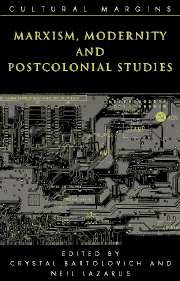Book contents
- Frontmatter
- Contents
- 1 Introduction: Marxism, modernity and postcolonial studies
- Part I Eurocentrism, “the West,” and the world
- 2 The rise of East Asia and the withering away of the interstate system
- 3 The fetish of ‘the West’ in postcolonial theory
- 4 The Eurocentric Marx and Engels and other related myths
- 5 Karl Marx, Eurocentrism, and the 1857 Revolt in British India
- Part II Locating modernity
- Part III Marxism, postcolonial studies, and “theory”
- References
- Index
5 - Karl Marx, Eurocentrism, and the 1857 Revolt in British India
Published online by Cambridge University Press: 22 September 2009
- Frontmatter
- Contents
- 1 Introduction: Marxism, modernity and postcolonial studies
- Part I Eurocentrism, “the West,” and the world
- 2 The rise of East Asia and the withering away of the interstate system
- 3 The fetish of ‘the West’ in postcolonial theory
- 4 The Eurocentric Marx and Engels and other related myths
- 5 Karl Marx, Eurocentrism, and the 1857 Revolt in British India
- Part II Locating modernity
- Part III Marxism, postcolonial studies, and “theory”
- References
- Index
Summary
England, it is true, in causing a social revolution in Hindostan, was actuated only by the vilest interests, and was stupid in her manner of enforcing them. But that is not the question. The question is, can mankind fulfill its destiny without a fundamental revolution in the social state of Asia? If not, whatever may have been the crimes of England she was the unconscious tool of history in bringing about that revolution.
(Karl Marx, “The British Rule in India,” New York Daily Tribune, 25 June 1853)By and by there will ooze out… facts able to convince John Bull himself that what he considers a military mutiny is in truth a national revolt.
(Karl Marx, “The Indian Question,” New York Daily Tribune, 14 August 1857)The 1857 Revolt in British India was unique in that it was a “convergence of various strands of resistance” on a vast and intense scale, involving mutinies of sepoys (soldiers), mass insurrections of peasants, revolts of princes in central India, and taluqdars (landholders) in newly annexed Avadh (called “Oude”) and spreading across northern India (Bose and Jalal 1998: 88). In May 1857, a group of soldiers, recently mutinied from the Bengal Army at Meerut, and the rebellious villagers who joined them, entered Delhi and placed an unwilling Bahadur Shah II, the nominal heir of the old Mughal Empire, on the throne.
- Type
- Chapter
- Information
- Marxism, Modernity and Postcolonial Studies , pp. 81 - 98Publisher: Cambridge University PressPrint publication year: 2002
- 12
- Cited by



